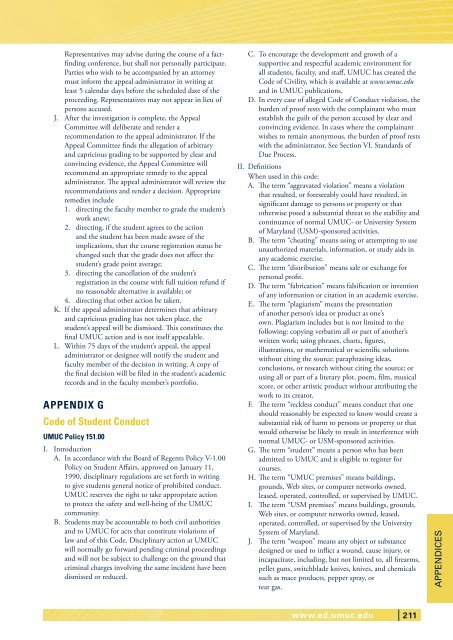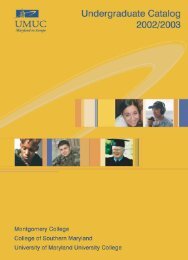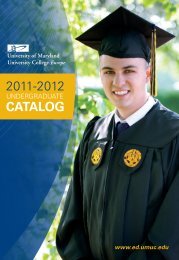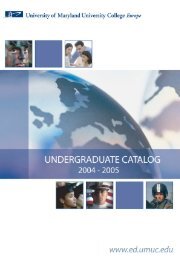UNDERGRADUATE CATALOG - UMUC Europe
UNDERGRADUATE CATALOG - UMUC Europe
UNDERGRADUATE CATALOG - UMUC Europe
You also want an ePaper? Increase the reach of your titles
YUMPU automatically turns print PDFs into web optimized ePapers that Google loves.
Representatives may advise during the course of a factfinding<br />
conference, but shall not personally participate.<br />
Parties who wish to be accompanied by an attorney<br />
must inform the appeal administrator in writing at<br />
least 5 calendar days before the scheduled date of the<br />
proceeding. Representatives may not appear in lieu of<br />
persons accused.<br />
J. After the investigation is complete, the Appeal<br />
Committee will deliberate and render a<br />
recommendation to the appeal administrator. If the<br />
Appeal Committee finds the allegation of arbitrary<br />
and capricious grading to be supported by clear and<br />
convincing evidence, the Appeal Committee will<br />
recommend an appropriate remedy to the appeal<br />
administrator. The appeal administrator will review the<br />
recommendations and render a decision. Appropriate<br />
remedies include<br />
1. directing the faculty member to grade the student’s<br />
work anew;<br />
2. directing, if the student agrees to the action<br />
and the student has been made aware of the<br />
implications, that the course registration status be<br />
changed such that the grade does not affect the<br />
student’s grade point average;<br />
3. directing the cancellation of the student’s<br />
registration in the course with full tuition refund if<br />
no reasonable alternative is available; or<br />
4. directing that other action be taken.<br />
K. If the appeal administrator determines that arbitrary<br />
and capricious grading has not taken place, the<br />
student’s appeal will be dismissed. This constitutes the<br />
final <strong>UMUC</strong> action and is not itself appealable.<br />
L. Within 75 days of the student’s appeal, the appeal<br />
administrator or designee will notify the student and<br />
faculty member of the decision in writing. A copy of<br />
the final decision will be filed in the student’s academic<br />
records and in the faculty member’s portfolio.<br />
APPEndix g<br />
Code of student Conduct<br />
umuC Policy 151.00<br />
I. Introduction<br />
A. In accordance with the Board of Regents Policy V-1.00<br />
Policy on Student Affairs, approved on January 11,<br />
1990, disciplinary regulations are set forth in writing<br />
to give students general notice of prohibited conduct.<br />
<strong>UMUC</strong> reserves the right to take appropriate action<br />
to protect the safety and well-being of the <strong>UMUC</strong><br />
community.<br />
B. Students may be accountable to both civil authorities<br />
and to <strong>UMUC</strong> for acts that constitute violations of<br />
law and of this Code. Disciplinary action at <strong>UMUC</strong><br />
will normally go forward pending criminal proceedings<br />
and will not be subject to challenge on the ground that<br />
criminal charges involving the same incident have been<br />
dismissed or reduced.<br />
C. To encourage the development and growth of a<br />
supportive and respectful academic environment for<br />
all students, faculty, and staff, <strong>UMUC</strong> has created the<br />
Code of Civility, which is available at www.umuc.edu<br />
and in <strong>UMUC</strong> publications.<br />
D. In every case of alleged Code of Conduct violation, the<br />
burden of proof rests with the complainant who must<br />
establish the guilt of the person accused by clear and<br />
convincing evidence. In cases where the complainant<br />
wishes to remain anonymous, the burden of proof rests<br />
with the administrator. See Section VI. Standards of<br />
Due Process.<br />
II. Definitions<br />
When used in this code:<br />
A. The term “aggravated violation” means a violation<br />
that resulted, or foreseeably could have resulted, in<br />
significant damage to persons or property or that<br />
otherwise posed a substantial threat to the stability and<br />
continuance of normal <strong>UMUC</strong>- or University System<br />
of Maryland (USM)-sponsored activities.<br />
B. The term “cheating” means using or attempting to use<br />
unauthorized materials, information, or study aids in<br />
any academic exercise.<br />
C. The term “distribution” means sale or exchange for<br />
personal profit.<br />
D. The term “fabrication” means falsification or invention<br />
of any information or citation in an academic exercise.<br />
E. The term “plagiarism” means the presentation<br />
of another person’s idea or product as one’s<br />
own. Plagiarism includes but is not limited to the<br />
following: copying verbatim all or part of another’s<br />
written work; using phrases, charts, figures,<br />
illustrations, or mathematical or scientific solutions<br />
without citing the source; paraphrasing ideas,<br />
conclusions, or research without citing the source; or<br />
using all or part of a literary plot, poem, film, musical<br />
score, or other artistic product without attributing the<br />
work to its creator.<br />
F. The term “reckless conduct” means conduct that one<br />
should reasonably be expected to know would create a<br />
substantial risk of harm to persons or property or that<br />
would otherwise be likely to result in interference with<br />
normal <strong>UMUC</strong>- or USM-sponsored activities.<br />
G. The term “student” means a person who has been<br />
admitted to <strong>UMUC</strong> and is eligible to register for<br />
courses.<br />
H. The term “<strong>UMUC</strong> premises” means buildings,<br />
grounds, Web sites, or computer networks owned,<br />
leased, operated, controlled, or supervised by <strong>UMUC</strong>.<br />
I. The term “USM premises” means buildings, grounds,<br />
Web sites, or computer networks owned, leased,<br />
operated, controlled, or supervised by the University<br />
System of Maryland.<br />
J. The term “weapon” means any object or substance<br />
designed or used to inflict a wound, cause injury, or<br />
incapacitate, including, but not limited to, all firearms,<br />
pellet guns, switchblade knives, knives, and chemicals<br />
such as mace products, pepper spray, or<br />
tear gas. APPEndiCEs<br />
www.ed.umuc.edu 211






